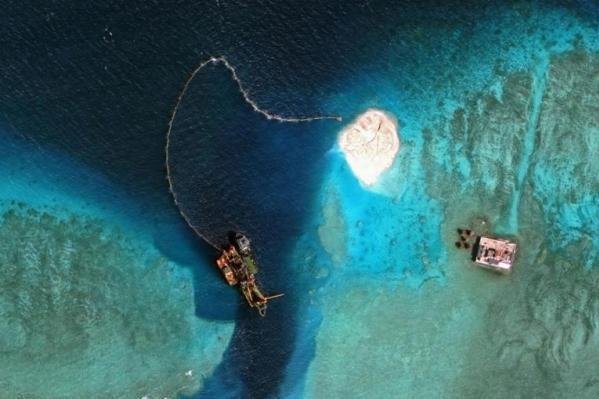A satellite image of Mischief Reef in the disputed Spratly Islands in the South China Sea, taken in 2015. China said Friday it has completed construction in the area. File Photo courtesy of CSIS Asia Maritime Transparency Initiative/DigitalGlobe
May 26 (UPI) -- Chinese state media issued a stern editorial two days after a U.S. destroyer sailed within 12 nautical miles of disputed islands Beijing has militarized in the South China Sea.
State tabloid Global Times described the U.S. move as a "violation of international law," adding the South China Sea is not a "wrestling ring."
"The strategic position of the South China Sea is meant to benefit China in the long run," the newspaper stated in the original Chinese. "That is because Chinese actions in the South China Sea are supported by international law and strong national power."
The newspaper editorial also claimed China has "already completed construction on the reefs and the islands in the South China Sea," and "even if U.S. warships come sailing by they will find a very different kind of scenery."
"Obama left an empty legacy despite his ambitious rebalancing strategy, while a pragmatic Trump is looking for his own ways to leave his mark. He will gradually realize that the South China Sea is not a place where the [United States] can flex its muscles," the editorial stated in the English-language version.
The reported freedom of navigation operation near the Spratly Islands on Wednesday is the first of its kind since President Donald Trump assumed office.
Analysts have said the diminished presence of U.S. vessels in waters claimed by China is a sign the United States and China had reached a compromise on the dispute, while Trump sought to gain China's trust and cooperation on North Korea.
Chinese pressure on North Korea to give up its nuclear weapons, however, may have reached its upper limit, the South China Morning Post reported Friday.
A Chinese state-linked think tank said Beijing would not support more sanctions against North Korea, according to a Chinese delegation that met with the National Committee on American Foreign Policy in New York.
"They feel that China has been doings its maximum, and the U.S. shouldn't expect too much more," said Stephen Noerper, a senior director at the Korea Society.















